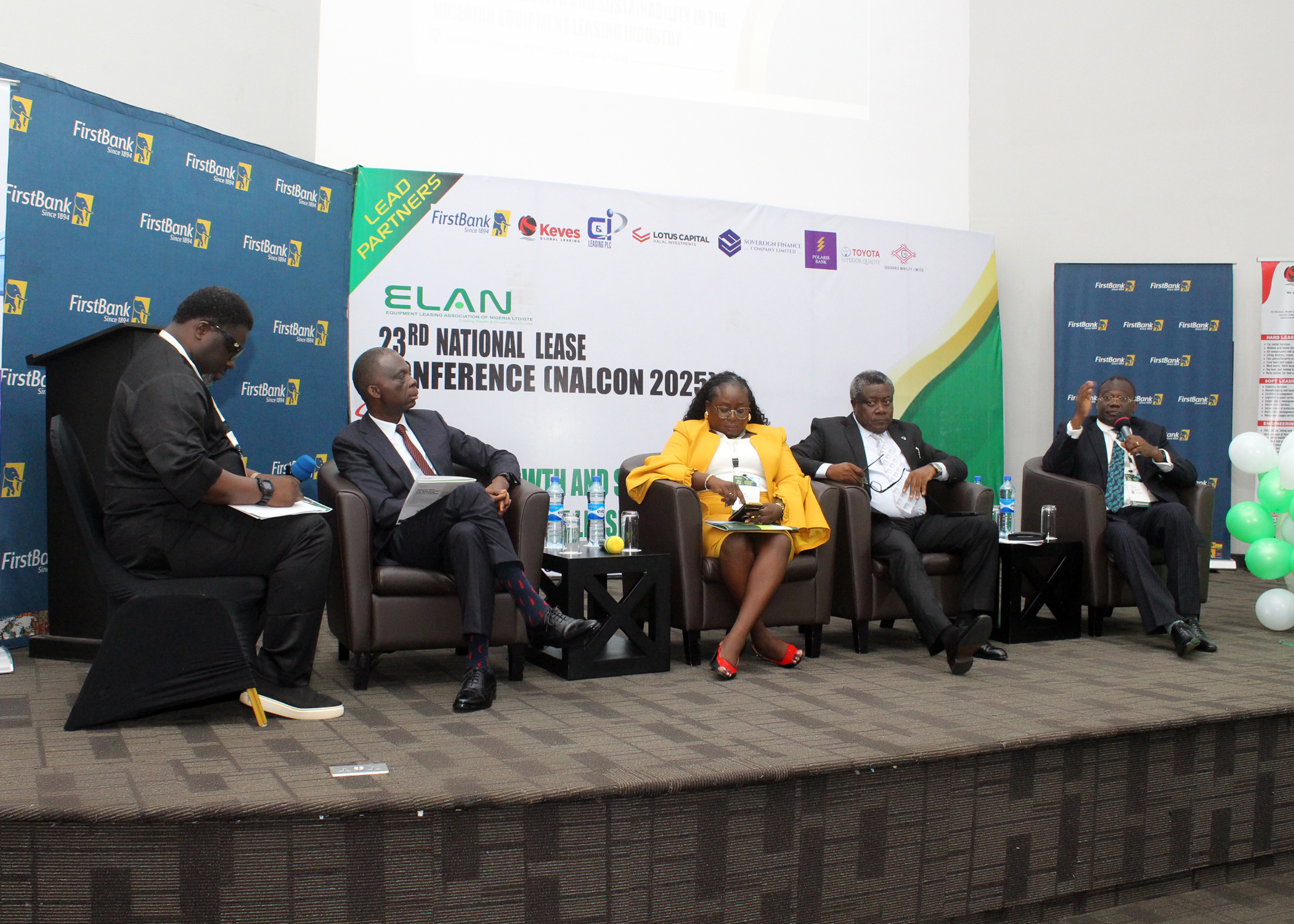
PROCEEDINGS AT THE 23RD NATIONAL LEASE CONFERENCE ORGANISED BY THE EQUIPMENT LEASING ASSOCIATION OF NIGERIA LTD/GTE (ELAN), HELD AT THE PROVIDENCE HOTEL, IKEJA – LAGOS, ON THURSDAY, 13TH NOVEMBER 2025.
1.0 BACKGROUND
In furtherance of its objective of promoting the ideals of leasing in Nigeria, the Equipment Leasing Association of Nigeria Ltd/Gte (ELAN) organised the 23rd National Lease Conference held on Thursday, 13th November 2025 at The Providence Hotel, Ikeja – Lagos. The Annual National Lease Conference is the biggest gathering of stakeholders in the Nigerian leasing industry, which has become a veritable platform for discussing pertinent issues affecting the development of the leasing industry and the economy at large.
This year’s conference, with the theme “ENHANCING GROWTH AND SUSTAINABILITY IN THE NIGERIAN EQUIPMENT LEASING INDUSTRY”, was informed by the need to put the leasing industry on the right pedestal to create value, stimulate growth, and enable it to perform its catalytic role to the economy more effectively.
The conference considered, among other things, the key issues affecting the leasing industry, explored ways to mitigate them, and shared strategies to stimulate growth, innovation and development in the leasing industry.
The conference attracted quality participation from high-net-worth professionals, including leasing practitioners, public sector officials, development partners, and the business community etc. Three major paper presentations were made by seasoned experts, supported by a panel discussion handled by distinguished panellists and a business networking session with major partners engaging distinguished participants at the event.
Topics presented and discussed were:
- Contemporary issues in the Nigerian regulatory environment: A Role and Impact Analysis – Theophilus Emuwa, Managing Partner, Aelex Legal Practitioners and Arbitrators, represented by Jibrin Dasun, Senior Associate, Aelex Legal Practitioners and Arbitrators
- Building resilience against shocks, market volatility, and growing the lease portfolio –Dr Muda Yusuf, Founder/CEO Centre for Private Enterprise (CPPE)
- Deepening the role of leasing in stimulating inclusive growth and economic development
– Oluseyi Oyefeso, Executive Director – Retail Banking South, First Bank Nigeria Ltd, represented by Sola Ogunsakin, Group Head, Retail Banking, First Bank Nigeria Ltd.
The discussions dovetailed into the panel discussion on the topic – “Enhancing Growth and Sustainability in the Nigerian Equipment Leasing Industry”. Panellists were Alex Mbakogu, Chief Operating Officer/Group Deputy Managing Director, C&I Leasing Plc; Debola Agunbiade, Managing Director/CEO, Candourcrest Africa Limited; Donald Wokoma, Registrar/CEO, Equipment Leasing Registration Authority (ELRA) (represented by Emmanuel Metuaghan, PhD., Director Planning, Strategy and Coordination, Equipment Leasing Registration Authority (ELRA); Wole Olomojobi, Cypress Leasing and Investments Limited and moderated by Ifeanyi Ogbor, MD/CEO Assetkap Investment Limited.
2.0 OBSERVATIONS
The conference observed that:
- The Nigerian economy, after several years of turbulence, is showing cautious signs of recovery. According to the National Bureau of Statistics, real GDP grew by 4.23%in the second quarter of 2025, compared to 3.48% in the same period of 2024. The non-oil sector — our main driver of growth – expanded by 3.64%, while the oil sector rebounded strongly by over 20% due to improved production and favourable base effects. These figures reflect not just a return to growth but a gradual rebalancing of our economy.
- Government efforts to stabilise the macroeconomic environment and improve fiscal management are beginning to yield results. Inflation, though still high, has shown signs of easing, declining from over 24% in March to 18.02 % in September, the lowest in recent years.
- Globally, equipment leasing has long been established as a creative financing alternative that enhances capital formation and supports economic growth. It represents about 20% of total investment in equipment and contributes roughly 1.5% to global GDP. The global leasing industry continues to play a pivotal role in providing access to productive equipment, helping businesses of all sizes to thrive, and supporting governments’ developmental initiatives. It contributes significantly to job creation, technological advancement, and international trade. The beauty of leasing lies in the multiplicity of benefits it delivers to those who choose to lease.
- Leasing today underpins critical segments of our economy — oil and gas, transportation, manufacturing, telecommunications, healthcare, agriculture, and construction. It allows businesses to acquire modern machinery and equipment without the heavy burden of upfront capital, enabling them to preserve liquidity, improve efficiency, and remain competitive. For many micro, small, and medium enterprises, leasing has become a lifeline, offering access to assets that would otherwise remain beyond reach.
- The overall essence of leasing is to enhance the planning, improvement, and development of any economy by building and supporting productive ventures.
- The industry is facing several issues – access to long-term and affordable funding remains a major constraint. The volatility of the exchange rate continues to affect imported equipment and lease pricing. Contract enforcement and asset recovery processes still pose difficulties, while awareness of leasing, particularly among MSMEs, remains limited; the concern of taxation, especially in the areas of Value Added Tax (VAT) and Withholding Tax, persists and continues to weigh heavily on operators in the industry.
- The global shift towards sustainability demands creativity. The future of leasing will be shaped by technology, digital transformation, and green finance. Leasing companies that embrace innovation, data-driven decision-making, and environmental responsibility will be best-positioned to thrive in the years ahead.
- While the leasing industry will continue to thrive by sustaining its resilience amid prevailing challenges, it is imperative for all stakeholders to work together to ensure the sustained development and growth of the sector. The government, as a major stakeholder, must provide a favourable regulatory environment and establish supportive mechanisms – such as accessible funding windows to stimulate industry development.
- The Equipment Leasing Registration Authority (ELRA), as the primary regulator, equally has a critical role to play. Through effective collaboration with industry practitioners, ELRA should ensure that the discharge of its mandate is more promotional than constraining, thereby fostering an environment that encourages innovation and growth.
- On its part, lessors must stay ahead of economic trends by realigning strategies and embracing innovation to continually deliver value to customers while positioning their businesses for long-term growth. Those who strategically adopt this approach will be best equipped to thrive in the evolving equipment leasing landscape.
- There is a need for ELAN to continue to promote best practices, advocate for a conducive operating environment, strengthen capacity building among practitioners, and engage effectively to address the challenges confronting our industry.
- Effective collaboration and synergy among stakeholders will further enhance the growth and sustainability ofthe industry.
- Low levels of lease awareness among the investing public, especially MSMEs, continue to hamper the growth of the leasing industry in Nigeria.
- Multiple registration is an issue that is affecting the smooth operation of businesses in Nigeria.
3.0 CONSEQUENTLY, THE CONFERENCE AGREED AS FOLLOWS:
- The government must be proactive and adopt value-added initiatives, such as Equipment leasing, to facilitate the speedy attainment of its agenda. In today’s reality in Nigeria, where there is a need for resource optimisation, all tiers of government should deepen their participation in public sector leasing. This model conserves capital and provides flexibility, enabling public entities to access essential equipment, technology, and infrastructure without significant upfront investment, leading to cost savings and avoidance of waste. By reallocating capital from asset acquisition to more strategic endeavours, governments can maximise their impact and deliver greater value to the citizenry.
- TheEquipment Leasing Registration Authority (ELRA), as the primary regulator, must be intentional in its approach. Through effective collaboration with industry practitioners, ELRA should ensure that the discharge of its mandate is more promotional than constraining, thereby fostering an environment that encourages innovation and growth.
- To enhance growth and sustainability in the industry, stakeholders must continue to be resilient and take proactive steps in the following areas:
- Make strategic plans to expand their leasing exposure beyond traditional markets, into resilient sectors – healthcare, agriculture, ICT, renewables; diversify client mix (SME, public sector, corporate structures, etc; mix assets of short and long term cycles while also expanding into emerging and new markets. Equally, develop green leasing products, e.g. Electric vehicles, solar equipment, waste management tools, to tap into sustainability-driven funding and demand.
- Ensure data-driven models are in place to assess and mitigate risks, strengthen internal audit functions with clear accountability lines.
- Ensure flexibility in funding – combine a mix of funds – build internal resources, commercial banks’ credit, bonds, equity financing, etc.
- Deploy information technology to improve efficiency – automate core processes, asset tracking and analytics for monitoring leased assets and client performance.
- Form strategic alliance with key stakeholders, including asset manufacturers (OEM) for asset sourcing, maintenance and resale value assurance; Vendors, banking/fintechs (as a product and as an enabler), insurance companies, leasing practitioners for big ticket leases and risk sharing, etc.
- Well-trained workforce – build internal leadership pipelines that will guarantee operational stability under extreme situations and ensure business continuity.
- The leasing industry should advocate for the harmonisation/integration of registries to create a one-stop registry for all security interests and leases on assets. this will reduce the burdens, ensuring clearer tax guidelines, enhancing market confidence, promoting investment and sustainable growth.
- The Government should utilise leasing in the public sector to achieve efficiency and cost savings. Also, in its developmental interventions in various sectors of the economy, including alleviating the adverse impact of government policies, besides the traditional support of giving loans to targeted businesses and individuals.
- ELAN should take proactive measures to increase the awareness level for equipment leasing as a creative financing option.
- The government should improve its support for the leasing industry, through ELRA, and create intervention funds for the industry. This will enhance the capacity of the industry to contribute more to national development.
4.0 CONCLUSION
The event marked another milestone for the industry’s efforts to promote equipment leasing as a veritable financing alternative that supports capital formation in the economy. Continued engagement in the various conversations with stakeholders shall be made for the realisation of the resolutions.
Download here:

